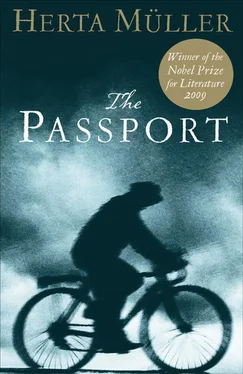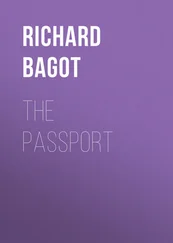The night had reached its peak. It pressed the sky out of the village. It was midnight. The Summer Night’s Committee stared at the half-dispersed sky. Under the sack the teacher looked at his pocket watch. Midnight had passed. The church clock had not struck.
The priest had stopped the church clock. Its cogged wheels were not to mark the hour of the sin. Silence was to accuse the village.
No one in the village slept. Dogs stood in the streets, without barking. Cats sat in the trees, looking with glowing lantern eyes.
People sat in their rooms. Mothers carried their children back and forward between burning candles. The children did not cry.
Windisch had sat under the bridge with Barbara.
The teacher had noted the middle of the night on his pocket watch. He stretched out his hand from under the sack. He signalled to the Summer Night’s Committee.
The apple tree didn’t move. The mayor cleared his throat because of the long silence. One of the wealthy peasants was shaken by a smoker’s cough. He quickly picked a tuft of grass. He put the grass in his mouth. He stifled his cough.
Two hours after midnight the apple tree began to tremble. At the top, where the branches forked, a mouth opened. The mouth ate apples.
The Summer Night’s Committee heard the mouth gnashing. Behind the wall, in the church, crickets were chirping.
The mouth ate its sixth apple. The mayor ran to the tree. He struck the mouth with his axe. The wealthy peasants raised their pitchforks in the air. They placed themselves behind the mayor.
A piece of bark — yellow and wet — fell into the grass.
The apple tree closed its mouth.
Not one of the Summer Night’s Committee had seen how and when the apple tree had closed its mouth.
The teacher crawled out of his sack. As a teacher he must have seen it, the mayor said.
At four o’clock in the morning the priest, wearing his long black cassock, beneath his big black hat, his black briefcase at his side, walked to the station. He walked quickly. Looking down at the ground. Dawn stood on the walls of the houses. The whitewash was light.
Three days later the bishop came to the village. The church was full. The people saw him walking between the benches to the altar. He climbed up to the pulpit.
The bishop didn’t pray. He said that he had read the teacher’s report. That he had consulted with God. “God has known for a long time,” he cried, “God reminded me of Adam and Eve. God,” said the bishop softly, “God has told me: The devil is in the apple tree.”
The bishop had written a letter to the priest. He wrote the letter in Latin. The priest read the letter from the pulpit. The Latin made the pulpit seem very high.
The night watchman’s father said he hadn’t heard the priest’s voice.
When the priest had finished reading the letter, he closed his eyes. He clasped his hands together and prayed in Latin. He climbed down from the pulpit. He seemed small. His face was tired. He turned to face the altar. “We must not fell the tree. We must burn it where it stands,” he said.
The old skinner would have been happy to buy the tree from the priest. But the priest said: “God’s word is sacred. The bishop knows what to do.”
That evening the men brought a waggonload of straw. The four wealthy peasants bound the trunk with straw. The mayor stood on the ladder. He spread straw where the branches forked.
The priest had stood behind the apple tree, praying loudly. The church choir stood alongside the boxwood hedge, singing long songs. It was cold and the breath of the songs was drawn up to the sky. The women and children prayed quietly.
The teacher lit the straw with a burning wood chip. The flame ate the straw. It grew. The flame swallowed the bark of the tree. The fire crackled in the wood. The crown of the tree licked at the sky. The moon covered itself.
The apples puffed up. They burst. The juice hissed, and whined in the fire like living flesh. The smoke stank. It stung the eyes. The songs were broken by coughing.
The village stood in the haze, until the first rain came. The teacher wrote in his exercise book. He called the haze “apple fog”.
For a long time a humped black stump stood behind the church.
People said that a man was standing behind the church. He looked like the priest without his hat.
Each morning dew fell. The boxwood hedge was sprinkled with white. The stump was black.
The sacristan took the faded roses from the altars and carried them outside behind the church. He passed the stump. The stump was his wife’s wooden arm.
Charred leaves whirled around. There was no wind. The leaves were weightless. They rose to his knees. They fell before his steps. The leaves crumbled. They were soot.
The sacristan took the faded roses from the altars and carried them outside the church. He passed the stump. The stump was his wife’s wooden arm.
A handful of ashes lay on the ground.
The sacristan put the ashes in a box. He went to the edge of the village. He scraped a hole in the earth with his hands. There was a crooked branch in front of his face. It was a wooden arm. It reached out to him.
The sacristan buried the box in the hole. He walked along a dusty path into the fields. He could hear the trees from far away. The maize had withered. Leaves broke wherever he went. He felt all the loneliness of the years. His life was transparent. Empty.
Crows flew over the maize. They settled on the maize stalks. They were made of coal. They were heavy. The maize stalks swayed. The crows flapped.
When the sacristan was back in the village, he felt his heart hanging naked and stiff between his ribs. The box with the ashes lay beside the hedge.
The neighbour’s spotted pigs are grunting loudly. They are a herd in the clouds. They pass over the house. The veranda is caught in a web of leaves. Each leaf has a shadow.
A man’s voice is singing in the sidestreet. The song floats through the leaves. “The village is very large at night,” thinks Windisch, “and its end is everywhere.”
Windisch knows the song: “Once I travelled to Berlin, the beautiful town to see. Tirihaholala all night long.” When it is so dark, when the leaves have shadows, the veranda grows upwards. It presses up under the stones. On a prop. When it has grown too high, the prop breaks. The veranda falls to the ground. Back to where it was. When day comes, no one sees that the veranda has grown and fallen.
Windisch feels the pressure on the stones. There’s an empty table in front of him. Terror is standing on the table. The terror is between Windisch’s ribs. Windisch feels the terror hanging like a stone in his jacket pocket.
The song floats through the apple tree: “Send to me your daughter do, for I wish to fuck her now. Tirihaholala all night long.”
Windisch pushes a cold hand into his jacket pocket. There is no stone in his jacket pocket. The song is between his fingers. Windisch sings along softly: “Sir, that will not do at all, my daughter dear will not be fucked. Tirihaholala all night long.”
The clouds trail over the village, because the herd of pigs in the clouds is so large. The pigs are silent. The song is alone in the night: “Mother mine, allow me please, why then do I have a hole. Tirihaholala all night long.”
The way home is long. The man is walking in the dark. The song has no end. “Oh mother dear, do lend me thine, for mine it is so very small. Tirihaholala all night long.” The song is heavy. The voice is deep. There is a stone in the song. Cold water is running over the stone. “Oh, I cannot lend it you, for your father needs it soon. Tirihaholala all night long.”
Windisch pulls his hand out of his jacket pocket. He loses the stone. He loses the song.
Читать дальше












